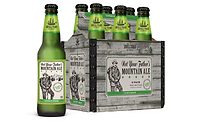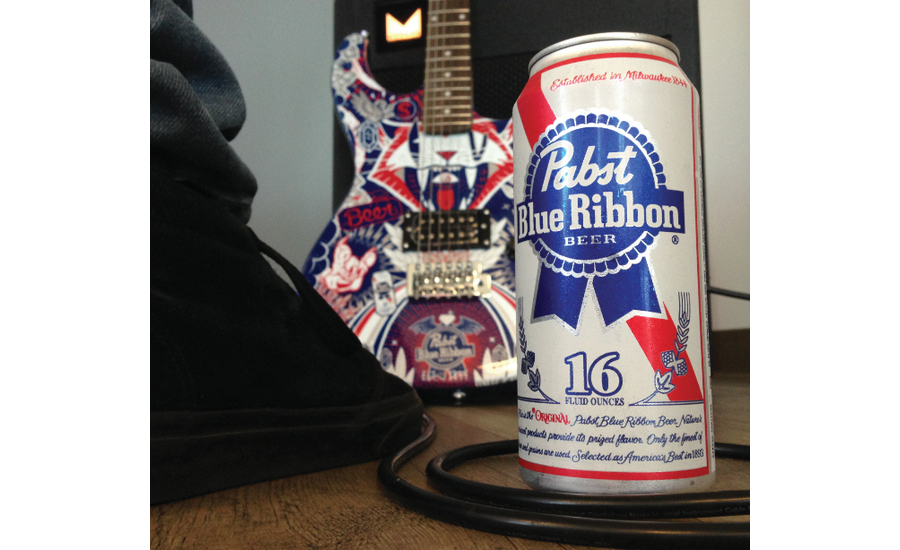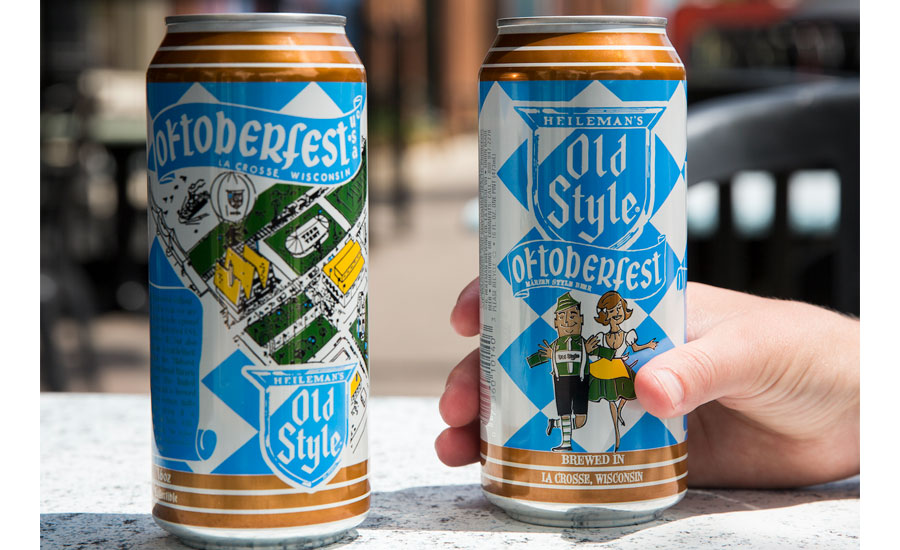2016 Executive of the Year: Eugene Kashper of Pabst Brewing Co.
Chairman, chief executive officer premiumizes portfolio through partnerships












It was only two years ago that Eugene Kashper, in partnership with a San Francisco-based equity firm, acquired Pabst Brewing Co. In the Los Angeles-based company’s first year — 2015 — with Kashper serving as chairman and chief executive officer, Pabst Brewing saw its net revenue grow more than 20 percent while also diversifying its product mix.
A growing work force, a focus on Heritage brands and active expansion of the company’s international presence are among the other accomplishments that have taken place under Kashper’s leadership. Yet, his guidance has expanded beyond the Pabst Brewing portfolio. The company has forged partnerships with Tsingtao Beer, its first import brand; Small Town Brewery, which manufacturers the Not Your Father’s Root Beer (NYFRB); and Vermont Hard Cider Co., a division of C&C group that manufacturers numerous hard cider brands, including Woodchuck Hard Cider.
Kashper also is bringing the Pabst name back to its original home in Milwaukee with the launch of a microbrewery in 2017.
Recently, Kashper also brought on another executive to help support the company's growth. Simon Thorpe joined Pabst Brewing as chief executive officer, while Kaspher will remain full-time chairman of the Board.
For these reasons and many more, Kashper has been named as Beverage Industry’s 2016 Executive of the Year.
‘Unbelievable opportunity’
Kashper’s decision to pursue the 172-year-old company stems from his long career in the brewing industry.
“Brewing is the greatest industry; I got into it 23 years ago and don’t ever want to get out,” he says. “It’s just so much fun to sell beer. And the U.S. market is by far the largest profit pool in the world for beer, so I had been looking for the right opportunity here for quite some time and have been keenly aware of the [Pabst Blue Ribbon] (PBR) brand and Pabst as a company that has huge potential.”
Kashper’s career has been fostered by working with many brands and companies that have a rich history. Because of this, he says he was excited to work with brands like Pabst, Lone Star, Rainier, Old Style, Natty Boh, Schlitz, Colt 45, Stroh’s, Falstaff and many others within the Pabst Brewing portfolio. “It’s an unbelievable opportunity to work with these iconic brands,” Kashper says.
He adds that Pabst Brewing’s position as a mid-size, independent brewer allows the company to focus on organic growth rather than prioritizing mergers and acquisitions and cost synergies like its much larger multinational competitors.
“PBC was perfectly positioned for growth,” Kashper says. “Pabst already had a great network of wholesaler partners and a strong team of sales and marketing professionals. In my experience, an efficient route to market is really the key to success in our industry and Pabst has that.”
Upon the transition, Kashper wanted to instill a culture that encourages employees’ ideas. “I just try to be honest and open with people and to show [them] that I trust them,” he says. “I want people to challenge me and to stand up for their own bold ideas — and not to be afraid to fail or to shy away from responsibility — that’s really the most important thing.
“We have a really enthusiastic group that loves these brands and brings incredible passion,” Kashper continues. “We are working hard to build a truly cohesive team and to foster an entrepreneurial mindset — those things take time, but we are well on our way.”
Some of that enthusiasm already can be seen through the company’s hiring practices. More than half of Pabst Brewing’s employees have been hired in the past year and half, according to Kashper. This all plays into the culture that is helping Pabst Brewing stand out in the beer market.
“We aim to be the most entrepreneurial supplier in the beer industry, and we want to have the most fun — we have a true start-up mentality while still having the scale to efficiently make a lot of great beer,” he says. “We also love partnering with people — distributors, retailers and fellow brewers. I believe Pabst’s culture, treasure trove of iconic Heritage brands and our ability to truly partner with independent brand owners sets us apart from other industry participants.”
Value of partnerships
Recognizing the competitive landscape for the U.S. beer market as well as the share that beer has lost to wine and spirits throughout the years, Kashper adds that those with an innovative spirit have the potential to change that.
“[L]ike in other consumer goods categories, the pace of change is accelerating and there is so much innovation white space for the industry — that’s a great opportunity for an independent brewer like Pabst,” he says. “Premiumization is also a huge opportunity as beer is quite affordable in the U.S. relative to other countries.”
Pabst Brewing has realized this opportunity by moving into high-end segments through its partnerships.
“The beer industry is now over 40 percent high-end brands — that includes craft, import, [flavored malt beverages] (FMB) and the super-premium segment,” Kashper says. “Given the strength of the economy, those segments continue to grow and gain share so it is likely that they will represent over half of industry dollars in several years. Our job, as a supplier, is ultimately to serve our customers — consumers, retailers, distributors — whether it be through Heritage innovation or new partnerships, to offer them a selection of brand stories and beer recipes that correspond to their needs. Consumers are all clearly asking for higher-end products; and that’s not just beer, it’s every category. For us, the best way to offer that is not to acquire, like the mega brewers, but to partner with passionate brand owners.”
As a heritage company itself, Pabst Brewing was drawn to its relationship with Tsingtao because of its long-standing history and market share within China.
“Tsingtao is a brand with a great history, and it’s a very strong brand in a few specific cities in the U.S. — namely San Francisco, New York and L.A. — it is also very strong in Asian-themed on-premise accounts, specifically in Chinese, Korean, Vietnamese, Thai and other Asian food establishments, so it’s a very stable business,” Kashper says. “Our challenge is to follow what Tsingtao has been able to achieve in markets like the U.K., Australia, Korea and others, which is to tell this brand’s unique story and to start gaining more traction with general market consumers.”
Yet, Kashper knows that innovation is just as valuable to consumers as heritage, which is what drew him to Small Town Brewery and its NYFRB.
“I knew about Small Town for a couple of years and met Tim Kovac, the founder, back in 2014,” he says. “It was clear right away that he had created something truly innovative and special with Not Your Father’s Root Beer and some of his other great brews: the ginger ale and the vanilla cream ale and others. And consumers certainly agree.”
With the support of Pabst Brewing, NYFRB and its extension varietals (Not Your Father’s Ginger Ale and Not Your Father’s Vanilla Cream Ale) have continued to penetrate markets.
“Especially in the last couple of months, we are seeing Not Your Father’s start to grow its share again as consumers move away from some of the copycat products that are out there,” Kashper says. “The Not Your Father’s brands (root beer, ginger ale and vanilla cream ale) are the most productive in the category in terms of dollar sales per store per week, so retailers and distributors are taking notice and it’s just a question of giving these brands what they deserve in terms of distribution levels and display activity.”
Recognizing the potential of Small Town Brewery’s gruit-inspried beers (gruit is German for herbs), the companies will launch a Not Your Mom’s line. “We absolutely do plan to expand the Small Town portfolio by bringing some new brews to market — most notably Not Your Mom’s Apple Pie Ale and Not Your Mom’s Strawberry Rhubarb Ale, which will both be out this spring,” Kashper says. “We have also created an unbelievable iced tea under the Not Your Mom’s line, which will be available this summer as well. We are very excited about the potential for these brands.”
Yet, one beer segment — hard cider — was left untouched within the Pabst Brewing portfolio until its partnership with Vermont Hard Cider.
“We believe that cider is a timeless category that is here to stay,” Kashper says. “Woodchuck is the iconic American cider brand that has a great heritage, the best cidery in America and unbelievable products. We feel the brand just needs some tender love and care and the support of a scale organization and it will get back to growth. Magners, the iconic Irish cider brand that we are importing, is already growing.
“The partnership with Vermont — just like our other partnerships — meets all [of] our key criteria,” he continues. “First, it’s a segment and brand with great potential. Second, there are great synergies for our sales and supply chain platform that will help us enhance our capabilities; and third, there is a committed brand owner who can add a lot of value to our efforts and a great cultural fit. ”
Noting that Pabst Brewing encountered some challenges when it forged the partnership with Vermont Hard Cider, Kashper says the brands already are showing improvement.
“Since our March 1 start date, it has certainly been a complex transition, but we are just rolling out new packaging with the Woodchuck image back on the label front and center, and with programming to support that,” he says. “We see the numbers for Woodchuck improving, and we expect to start recapturing some of the distribution that was lost over the past couple of years in spring 2017. ”
However, Kashper does recognize that as the company’s embarks on new partnerships, it must protect all of Pabst Brewing’s brands, which it is doing through dedicated teams that employ clear, disciplined strategies.
“We need to make sure that we are not competing with ourselves, so that each of our brands can meet completely different consumer needs and have its own clear strategy when it comes to branding, packaging, pricing, focus channels and geographies,” he explains. “Instead of just buying brands or businesses outright, we prefer having great partners who don’t want to sell out and retire but rather those who know their business, who are in sync with the DNA of their brand, and who are committed to utilizing our platform capabilities to maximize the success of the brand in a true long-term partnership with us. That way we can do what we do best — execute in the marketplace — while the founder and their team can continue to create the magic for the brand through innovation and by telling the brand story.”
Style for every occasion
Although Pabst Brewing’s partnerships have helped the company to diversify its portfolio to compete in the more premium beer segments, Kashper says that the company’s Heritage brands and styles still resonate with consumers.
“There’s a consumer and an occasion for every beer style under the sun, but we want to stay true to our roots,” he says. “Whether it’s Pabst or Lone Star or Rainier, we are looking to layer on some flavorful but drinkable authentic brews to complement our American style lagers. But the classic lagers offer consumers what they crave — even if they enjoy craft beer — sometimes people need simplicity, clarity and drinkability, [and] that’s what our brands offer with amazing stories and a rich heritage to boot.”
This rich heritage played a hand in the company’s most recent release: Old Tankard Ale (OTA).
“We wanted to bring back an iconic Pabst brand and to stay true to the original look and recipe,” Kashper says. “It was a lot of fun recreating this fantastic brew, and the beer was incredibly well received. Ultimately OTA has quite a niche craft brew taste profile, so we don’t see it as a big national brand. We plan to brew it in limited quantities out of our new Pabst Brewery in Milwaukee, which will open this spring.”
The American Ale was first produced in the 1930s and is brewed today based on a recipe from Pabst’s 1937 brewer’s log, the company says. With a 5.8 percent alcohol by volume and 35 bitterness units, the ale features Nugget, Liberty, Willamette and Cascade hops, it says.
The company also recently released Stroh’s Bohemian Style Pilsner. “Greg Deuhs, our master brewer, has crafted an exceptional European-style pilsner that we brew in the heart of Detroit using Saaz and Magnum hops with Vienna malt,” Kashper explains. “The result is a crisp, balanced pilsner with a floral aroma, subtle hop spice, and a rich, bready maltiness.”
Additionally, the company’s dedication to offering its Heritage brands at a fair price point while delivering on drinkability can be found in Pabst Brewing’s recent successes. “[W]e simply offer better quality at a better price — PBR won the Gold Medal for American Lager again this year at the Great American Beer Festival; that’s the fourth time in 11 years, so consumers really appreciate that they are getting a great beer at a very fair price,” Kashper says.
Although Kashper is proud of Pabst Brewing’s rich heritage, he recognizes the engagement needs of younger legal-drinking-age consumers.
“We are very focused on grass roots marketing and also on timeless marketing principles — like offering value,” he says. “Our consumers for PBR are younger and higher income than those of the big corporate brands, and we also have a much higher overlap with craft consumers. Our big point of differentiation is as much about what we don’t do as what we do. The programs we run are highly differentiated and they are also local — we don’t talk down to consumers and we don’t try to convince them that they should live a certain way or drink our beer by bombarding them with national ads and pushy promos.”
For example, PBR maintains an art and music focus, but the partnerships that it embarks on with musicians and artists do not include traditional contracts. They are forged because the company likes the artist and the artist likes the company, he says.
Social media also is the main outreach for the company, allowing Pabst Brewing to utilize organic communication with consumers.
“We let consumers drive the programming and the communication — our social media content is consumer generated and our art that we are using on packaging or [point-of-sales] (POS) is largely consumer generated — not stuff we commissioned some agency to do,” Kashper says.
Going forward, Kashper is focused on attaining some key brand and company goals.
“We aim to return to fast growth with PBR, to accelerate Lone Star and Rainier and to build out our portfolio of local legends,” he says. “We hope to grow exponentially with the Not Your Father’s and Not Your Mom’s brands by continuing our groundbreaking innovation and expanding the beer category. We also expect to grow our Colt 45 business, which continues to improve.
“I would like Pabst Brewing Co. to be known as the most dynamic independent brewer in the U.S.,” Kashper continues. “That starts with building a great culture, attracting and keeping talented, passionate people and building really strong training programs.” BI
Designed with consumers in mind
Los Angeles-based Pabst Brewing Co. might be 172 years old, but that doesn’t mean the domestic brewer hasn’t embraced the marketing and consumer outreach strategies that appeal to the modern consumer market.
“We don’t really do traditional media, so social media is our main means of communication with consumers,” says Eugene Kashper, chairman and chief executive officer of Pabst Brewing. “We work hard to integrate our in-store programming and lifestyle marketing programs with our social media efforts. Social media becomes our eyes and ears to the local marketplace. We are constantly interacting with our consumers via these channels and making sure we understand what our local consumers are interested in.”
In addition to social media, Pabst Brewing has integrated some of its brands throughout the music and arts scenes.
“For instance, Colt 45 has had some great partnerships this year with Billy Dee Williams and now Juicy J. For [Pabst Blue Ribbon] (PBR), we have had great success in creating our own music festival — Project Pabst — which we did in Denver, Philly, Portland and Atlanta this year and to which people traveled from all over the country,” Kashper says. “PBR just won a gold medal in the American Lager category at the [Great American Beer Festival] (GABF) so we are also hoping to leverage that win across all consumer touch points to reinforce that we not only have a great brand, but that we make great beer. Our focus with our brands is very grass roots / local marketing working with local community leaders, retailers and distributors to make our brands an integral part of the local community.”
Community ties can be seen throughout the company’s portfolio of brews. “In order to play an integral role in each local community, all of our brands are involved in programs that support the communities they serve,” Kashper says. “PBR supports local musicians and artists with our PBR artists’ grants program by awarding monetary grants to emerging artists to offer them studio time, purchase new equipment, providing transportation, health care coverage and other forms of support. Our local legends brands such as Lone Star in Texas, Old Style in Chicago, Rainier in the Pacific Northwest, Natty Boh in Maryland are all involved in charitable programs.
“A great example of this work is The Rainier Tabs for Trees program — for every tab collected, we plant a tree in the Pacific Northwest,” he continues. “With Lone Star we work with the Texas Dance Hall Preservation Society to promote public awareness, preservation and continuing use of historic Texas dance halls. We also have a program for next summer working with the “Don’t Mess With Texas” organization to keep Texas clean. Natty Boh has a program to keep the Bay clean in Baltimore. We have every brand working in the local communities to work with our consumers on causes that are important to them.”
Kashper adds that the company’s involvement in these programs is important because it wants to contribute to programs that its consumers are passionate about as well as make the world a better place. This mindset also can be seen throughout its partnership brands, including its most recent partner: Dog Tag Brewing.
“One partnership that just launched is our partnership with the Dog Tag Brewing and their charitable foundation, founded by Marine combat veteran Seth Jordan,” Kashper says. “We are rolling out distribution of Dog Tag’s Legacy Lager nationwide. We are really excited to partner with Seth and Dog Tag. Seth’s passion for remembering, honoring and celebrating our nation’s heroes is inspiring. We are truly honored to have the opportunity to support Gold Star families in their charitable endeavors and to help spread Dog Tag’s message nationwide. Dog Tag Brewing donates 100 percent of its after-tax profits to the Dog Tag Brewing Foundation, which benefits charities created or selected by Gold Star Families.
“Seth Jordan founded Dog Tag Brewing in 2014 with an invitation for the American public to ‘Toast a Hero’ as they read the name of a fallen warrior printed on each can,” he continues. “Today, Seth serves as chairman of the Dog Tag Brewing Foundation, a nonprofit organization dedicated to supporting legacy building projects or selected by Gold Star Families, the families of fallen military personnel. Dog Tag Foundation will provide grants to Gold Star family charities and offer free consulting services to help families create impactful, sustainable organizations in honor of their loved ones.”
Looking for a reprint of this article?
From high-res PDFs to custom plaques, order your copy today!












